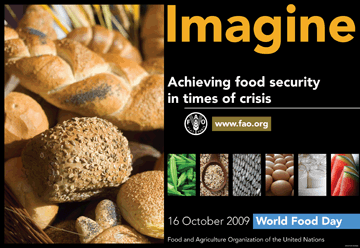
World Food Day
Encyclopedia
World Food Day is celebrated every year around the world on 16 October in honor of the date of the founding of the Food and Agriculture Organization
of the United Nations
in 1945. It is also the Food Engineer day.
The World Food Day theme for 2011 is "Food prices - from crisis to stability".

It has since been observed every year in more than 150 countries, raising awareness of the issues behind poverty and hunger.
Most of the themes revolve around agriculture because only investment in agriculture – together with support for education and health – will turn this situation around. The bulk of that investment will have to come from the private sector, with public investment playing a crucial role, especially in view of its facilitating and stimulating effect on private investment.
In spite of the importance of agriculture as the driving force in the economies of many developing countries, this vital sector is frequently starved of investment. In particular, foreign aid to agriculture has shown marked declines over the past 20 years.
Food and Agriculture Organization
The Food and Agriculture Organization of the United Nations is a specialised agency of the United Nations that leads international efforts to defeat hunger. Serving both developed and developing countries, FAO acts as a neutral forum where all nations meet as equals to negotiate agreements and...
of the United Nations
United Nations
The United Nations is an international organization whose stated aims are facilitating cooperation in international law, international security, economic development, social progress, human rights, and achievement of world peace...
in 1945. It is also the Food Engineer day.
The World Food Day theme for 2011 is "Food prices - from crisis to stability".

Origins
World Food Day (WFD) was established by FAO's Member Countries at the Organization's 20th General Conference in November 1979. The Hungarian Delegation, led by the former Hungarian Minister of Agriculture and Food, Dr. Pál Romány has played an active role at the 20th Session of the FAO Conference and suggested the idea of celebrating the WFD worldwide.It has since been observed every year in more than 150 countries, raising awareness of the issues behind poverty and hunger.
Themes
Since 1981, World Food Day has adopted a different theme each year, in order to highlight areas needed for action and provide a common focus.Most of the themes revolve around agriculture because only investment in agriculture – together with support for education and health – will turn this situation around. The bulk of that investment will have to come from the private sector, with public investment playing a crucial role, especially in view of its facilitating and stimulating effect on private investment.
In spite of the importance of agriculture as the driving force in the economies of many developing countries, this vital sector is frequently starved of investment. In particular, foreign aid to agriculture has shown marked declines over the past 20 years.

